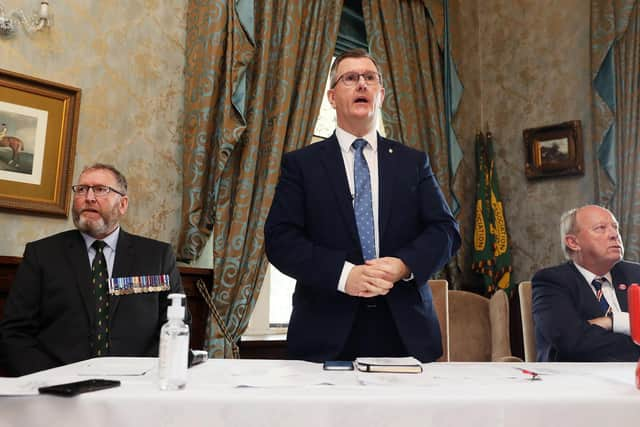Letter: Letter: Unionism has made itself clear - it’s either the protocol or power-sharing, not both


(Jamie Bryson’s letter in full to DUP leader Sir Jeffrey Donaldson, UUP leader Doug Beattie and TUV leader Jim Allister)
I write on behalf of Unionist Voice Policy Studies, an organisation which represents a broad range of groups and individuals across the grassroots unionist and loyalist community.
Advertisement
Hide AdAdvertisement
Hide AdYou will recall the fundamental commitments made on Ulster Day 2021 in the pan-unionist declaration. This encompassed both an overarching commitment, and an attached explanatory note which- in particular- emphasised the unalterable demand for the full restoration (that means fixing what is broken, not promising not to break it further) of Article 6 of the Acts of Union, described correctly by Lord Trimble in 1998 in the following way:


“The Act of Union is the Union”
It was upon the basis that that fundamental constitutional core was protected by the principle of consent that pro Agreement unionism was (erroneously) based.
It obviously transpired pro Agreement unionism got it disastrously wrong in 1998 and the principle of consent turned out to be much less than was promised to the unionist community.
This deceit was set out in graphic terms by Lord Trimble in his affidavit in the Allister legal cases. Quite aside from anything else, given this issue, what now is the credible basis for pro Agreement unionism at all?
Advertisement
Hide AdAdvertisement
Hide AdIn any event, returning to Stormont would require implementing the subjugation and suspension of Article 6 of the Acts of Union- a clear breach of the commitments given by all unionist leaders.
The incompatibility with the Acts of Union comes about primarily due to two issues: (i) the fettering of trade via the ‘two lane’ system which represents a hard customs border in the Irish Sea (red lane) and a soft customs border in the Irish Sea (green lane).
It shouldn’t be missed that even the green lane requires customs processes (see Article 9 (2) of the joint committee decision 01/2023).
(ii) the continued application of EU law. The DUP and TUV, both clearly understanding the issue, have been clear throughout the campaign that there can be no continued application of EU law.
Advertisement
Hide AdAdvertisement
Hide AdThe consequences of these fundamental issues are that the breach of Article 6 is clear and continuing, and there is no way to cure that breach within the confines the Framework.
Therefore any unionist who returned to Stormont would be accepting of the subjugation of the Acts of Union, and indeed a collaborator in the implementation of that constitutional diminution of the Union.
The suggestion the Framework could be challenged from within Stormont is, to be frank, idiocy.
Firstly, the Stormont brake is impotent. It is a high test to even use it, and even if that is overcome, ultimate authority is vested in Arbitration (wee Article 175 of the Withdrawal Agreement).
Advertisement
Hide AdAdvertisement
Hide AdAnyone who wants to know how the brake works- in detail- simply needs to read the Windsor Framework (Democratic Scrutiny) Regulations 2023.
Secondly, the 2024 vote is an exercise in unionist debasing given the disapplication of cross community consent. Why would any unionist validate this betrayal of the Belfast Agreement?
Thirdly, the TCA review is not a renegotiation but a ‘review’: the clue is in the title. In any event this is not a devolved matter, and Stormont can have no impact upon it.
If the logic is we must return to Stormont because ‘we can’t hand power to the UK Government as they can’t be trusted’ then it’s somewhat illogical to say in the next breath ‘our saviour will be that same Government when they review the TCA’.
Advertisement
Hide AdAdvertisement
Hide AdThe proposals on the table by the Government are, to be brutally honest, a joke. A statutory instrument creating a vague duty not to further diminish the Acts of Union does nothing to cure the damage already done, and in any event would still be subject to the all conquering section 7A of the EUWA 2018 (the conduit pipe through which the Protocol Framework flows) and therefore if the new secondary legislation ran up against the Protocol Framework, it would have to give way.
It is therefore purely symbolic (and even symbolically it’s nonsense) and utterly worthless.
Put simply, unalterable commitments have been made. The unionist base- according to all polls- stands firmly behind unionism’s principled stand: protocol or power sharing, never both.
A surrendering on these issues by returning to Stormont would- in our analysis- ignite significant instability, and without any doubt precipitate a return to mass street protests.
Advertisement
Hide AdAdvertisement
Hide AdIt would, in our view, also be the case that a significant swathe of grassroots unionism/loyalism would actively electorally campaign against any unionist who had opted for the role of collaborator and implementer in the subjugation and suspension of the Union.
Two years on from the Ulster Day commitment, it is hoped that all unionist leaders will be cognisant of those promises.
Jamie Bryson, head of policy and research, Unionist Voice Policy Studies